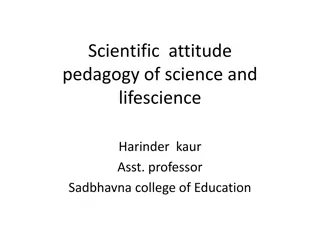
Attitudes: Meaning, Formation, and Impact
Explore the concept of attitudes, learned predispositions towards the environment and objects, and how they influence behavior. Discover the salient features and factors contributing to attitude formation.
Uploaded on | 0 Views
Download Presentation

Please find below an Image/Link to download the presentation.
The content on the website is provided AS IS for your information and personal use only. It may not be sold, licensed, or shared on other websites without obtaining consent from the author. If you encounter any issues during the download, it is possible that the publisher has removed the file from their server.
You are allowed to download the files provided on this website for personal or commercial use, subject to the condition that they are used lawfully. All files are the property of their respective owners.
The content on the website is provided AS IS for your information and personal use only. It may not be sold, licensed, or shared on other websites without obtaining consent from the author.
E N D
Presentation Transcript
UNIT 2 Attitude
Meaning and Definition It reflects how one feels about something . According to Munn Attitudes are learned predispositions towards aspects of our environment. They may be positively or negatively directed towards certain people, service to institutions . Persistent tendency to feel and behave in particular way towards some object, person or events . Attitudes are evaluative statements either favourable or unfavourable concerning objects, people or events. They reflect how one feels about something .
The salient features which contribute to the meaning of attitudes are: i. Attitudes refer to feelings and beliefs of individuals or groups of individuals. ii. The feelings and beliefs are directed towards other people, objects or ideas. iii. Attitudes tend to result in behaviour or action. iv. Attitude can fall anywhere along a continuum from very favourable to very unfavourable. v. Attitudes endure. vi. All people, irrespective of their status or intelligence, hold attitudes.
Components or factors in attitude formation It is considered that attitude is learned from the environment in which they interact.






















